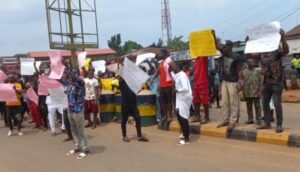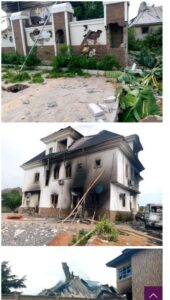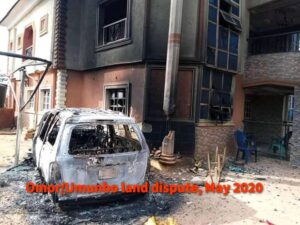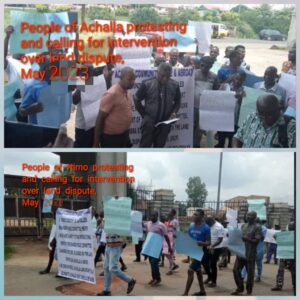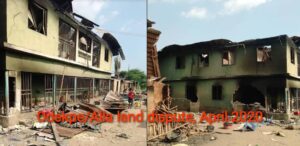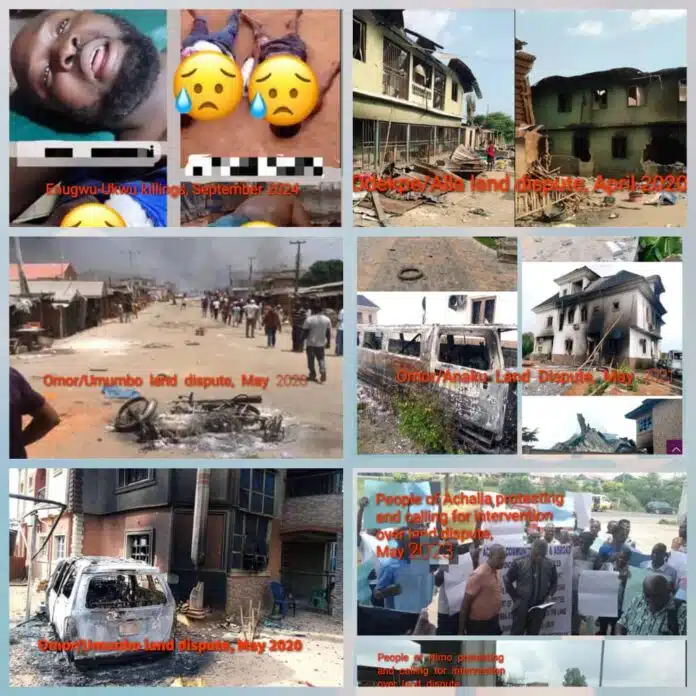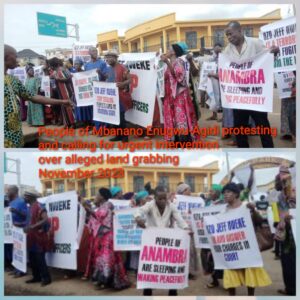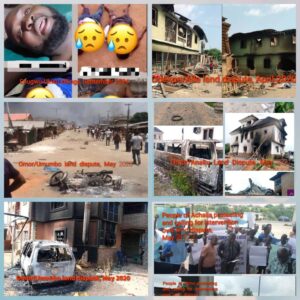By Izunna Okafor, Awka
The recent brutal violence that befell the people of Enugwu-Ukwu Community in Njikoka Local Government Area of Anambra State, where no fewer than three youths of the community were allegedly killed, with five others severely injured by unidentified persons over a suspected land boundary dispute with neighbuoring Nawfia community (also in Njikoka Local Government Area), has once again brought to the fore the critical issue of land disputes in the state.
The bloodshed, which occured exactly two weeks today, on Monday September 9, at the Agu Isioye boundary between Enugwu-Ukwu and Nawfia, threw the Enugwu-Ukwu Community into mourning mood, which was internationally observed on Thursday, September 19, in honour of the murdered persons. The incident serves not only as an unfortunate reminder of the dangers posed by unresolved land disputes between communities, but also underscored the urgent need for the state government and security agencies to always adopt a more proactive approach in addressing land boundary and any such disputes and cases before they escalate into violence.
Evidently speaking, land disputes are not new to Anambra State, and over the decades, many communities in the state have found and still find themselves locked in bitter confrontations over boundaries and ownership.
In the case of Enugwu-Ukwu and Nawfia, sources have it that tensions had been building for some time, with both communities laying claim to certain portions of land at the Agu Isioye. It is also alleged that the case had previously and repeatedly been reported to the state government and appropriate authorities, seeking intervention and a peaceful resolution.
However, probably as a result of endless delay, nothing significant was said to be done to de-escalate the situation, thereby leaving the communities to their fate, and to continue dragging each other over the said disputed land. Is there a better description of negligence?
This is evidently not particular to any administration or security leadership in the state, as such has been observed for years and in other parts of the State. This may also not totally imply that the state government or security agencies have completely been inactive in intervening, addressing or resolving land disputes in Anambra. There is, however, an urgent need for a sit up and more proactiveness. Even without the concerned communities having to directly petition, invite, or write to the relevant authorities for intervention, protests, media reports and speculations on such disputes when they have not yet turned violent should be enough to make the relevant authorities step into the matter early enough the same way they step into it uninvitedly when it turns bloody.
When disputes of this nature are left unresolved, it creates fertile ground for violence to erupt. In the case of Enugwu-Ukwu, it now took the tragic loss of young lives for the government to step in or start issuing a statement. Only after blood was spilled did the state government and security agencies begin to react, appealing for calm, with promises of setting up panels and conducting investigations into the matter.
This reactive approach, which has become a pattern in Anambra’s handling of land disputes, seriously raises important questions about the role of government and security agencies in preventing conflicts from spiraling out of control in the first place. Similar situation was also said to have occured in many other land disputes between communities in the state, including the Nsugbe/Umueri land dispute sometime in November 2023, the Umueri/Ogbunike land dispute in 2023, the Aguleri/Umueri land dispute clash in January 2021, and the protracted land disputes in communities of Igbakwu, Umumbo, Omor, Umuerum, and Anaku in Ayamelum local government areas, about which a concerned citizen of Ayamelum, Comrade Onuzulike John Udemezue, also penned a viral open letter to Governor Chukwuma Soludo in August 2024, calling for an urgent intervention to prevent the resurgence of bloodshed and destructions that have severally marred the areas over unresolved land disputes.
However, despite these, no known action appears to have been taken concerning that by the concerned authorities. But when another violent crime results from any of these, government and security agencies will be begin to investigate, issue press statements, and set up panels.
Beholding these, one cannot help but ask: Why do the government and security agencies usually wait until violence erupts before intervening? Why must bloodshed be the catalyst for action? As is the case in most scenarios, why do these concerned authorities usually stop their intervention at the level of returning calm after violent crimes in the affected communities, without finding a permanent solution to the land disputes that resulted in the violent crime? Are they only interested in addressing the outcome, without addressing the root cause (separating fight without resolving the cause of the fight)?
These are questions that have continued begging for answers, while the practice subsists. And when it happens, the communities would be left grieving and wondering why their earlier calls for intervention were seemingly ignored, allowing the situation to fester until it reached a deadly climax.
As it stands today, for many years now, the people of Mbanano Enugwu-Agidi community in Njikoka Local Government Area have been making peaceful protests, petitioning, and dishing out media publications, calling for the urgent intervention of the government and security agencies in the longstanding land dispute between them the the Ezinano Awka community. But despite these several calls and demonstrations, the dispute is still yet to be resolved, till date, while the communities are left to their fate.
Without doubt, this Mbanano/Ezinano land dispute, which has lasted for over 86 years now and still counting, is another clear example of how unresolved land disputes can breed animosity and resentment over time, especially when people exhaust their patience. One cannot imagine that despite numerous court judgments and petitions to the government and security agencies, the dispute has remained unresolved, as the people of Mbanano Enugwu-Agidi continue to appeal for intervention, lest the conflict also turn violent. Even the various alleged intimidations, brutality, destructions of farm crops, and other security-related threats that have been reported happening in the same land and nearby bushes in recent time due to the dispute appear to have been snubbed by the relevant authorities. Is the saying no longer valid that Delay is dangerous?
The Mbanano Enugwu-Agidi/Ezinano Awka case is particularly troubling because it shows that even when the courts have ruled on land disputes, government and security agencies still often fail to enforce these rulings. Unarguably, such negligence as this is what usually fuels frustration among the aggrieved parties, leading them to consider taking the law into their own hands. In such cases, why does the government choose inaction over enforcement? Why do communities continue to suffer from unresolved disputes even after legal verdicts have been delivered? These are questions that must be addressed if peace is to be restored to affected areas. Is it when bloodshed erupts or when the people tragically take laws into their hands by way of violent crimes that these concerned authorities would sit up and give listening ears to these long snubbed disputes and the people’s age-old appeals for intervention? It honestly ought not to be!
Land, as a vital resource, holds immense significance for communities in Anambra State. Ownership of land is not just a matter of economic importance but also a source of identity, history, and heritage. When disputes over land arise, they strike at the very heart of community life, threatening social cohesion and harmony. Considering these, therefore, the government has a moral and legal responsibility to ensure that these disputes are resolved swiftly and fairly, preventing them from escalating into violent confrontations.
In the case of Enugwu-Ukwu and Nawfia, it is clear that the dispute needed not to reach the point of bloodshed. Had the government intervened when the issue was first reported, lives could have been saved. Instead, the lack of proactive measures allowed tensions to simmer until they exploded in violence. Now, after the tragic loss of life, the government is reacting—setting up panels, issuing statements, and promising to conduct investigations. But these actions, while necessary, come too late for the families of the slain youths.
The reactive approach of the government and security agencies not only fails the victims but also undermines the trust that communities have in them. When people see that their concerns are only addressed after tragedy strikes, it creates a sense of abandonment and disillusionment with the government’s ability to protect them. Why should it take the spilling of innocent blood for the government and security agencies to act? This is a question that should haunt the consciences of those in power.
Proactivity, in contrast, would entail setting up mechanisms to detect and resolve potential land disputes before they escalate. The government should establish a standing committee on land disputes, made up of traditional rulers, legal experts, and representatives from the affected communities, to mediate and provide timely interventions. This body should be empowered to investigate claims, listen to grievances, and offer binding recommendations that can be enforced by the state. Additionally, security agencies should be involved early in the process to prevent any form of violence from occurring.
Furthermore, land disputes should be seen as a matter of public safety and treated with the urgency they deserve. Just as the government invests in preventing crime and maintaining law and order, it must also invest in preventing conflicts over land, which have proven to be a significant source of violence in some parts of Anambra State. The cost of prevention is far less than the cost of reacting after the fact—both in terms of human lives and the resources needed to restore peace.
Anambra State is not lacking in examples of what happens when land disputes are left unresolved. The Mbanano Enugwu-Agidi and Ezinano Awka case, as mentioned earlier, has dragged on for decades with no end in sight. This dispute, like many others in the state, remains unresolved despite court rulings and numerous petitions. If the government continues to ignore these festering issues, it is only a matter of time before more communities are plunged into violence, with innocent lives once again lost in the process.
The role of traditional rulers in these disputes cannot be overemphasized. Traditional institutions, which have long served as custodians of land and culture, are often sidelined in the resolution process. Yet, they hold the key to restoring peace and order in many of these communities. The government must work closely with traditional rulers, giving them the authority and support they need to mediate disputes before they escalate. These leaders, being closer to the people and understanding the cultural significance of land ownership, are better positioned to broker peace between warring factions.
In conclusion, the bloodshed in Enugwu-Ukwu is a tragic reminder that the government’s and security agencies’ reactive approach to land disputes is not only ineffective but dangerous. The loss of life, which could have been prevented, urgently necessitates a more proactive stance on land issues in the State. By setting up mechanisms for early intervention, empowering traditional rulers, and enforcing court rulings, the government can prevent future conflicts and restore faith in its ability to protect its people. It is time for the government to act before another tragedy strikes.
Anambra, evidently has many stories of communities torn apart by land disputes. But these stories do not have to end in bloodshed. The government has the power to change the narrative, to prevent violence before it happens, and to build a future where land disputes are resolved peacefully and justly. Let the September 9th bloodshed in Enugwu-Ukwu be the last, and let it serve as a wake-up call for the state to become proactive in intervening and resolving land disputes before more lives are lost.
Ndi Anambra deserve better. And the time to act is now.
